Report on Corporate Governance and Ethics: OECD Framework and Analysis
VerifiedAdded on 2023/01/09
|21
|4677
|100
Report
AI Summary
This report provides a detailed examination of corporate governance and ethics, with a specific focus on the framework and regulatory guidelines established by the Organisation for Economic Co-operation and Development (OECD). The introduction emphasizes the crucial role of corporate governance in business success and the importance of global regulatory bodies like the OECD in maintaining transparency and compliance. The report then offers an overview of the OECD, its objectives, and its organizational structure, highlighting its impact on global economic progress and corporate reporting standards. The core of the report analyzes the OECD's regulatory framework, including key principles such as transparency, accountability, prudence, integrity, monitoring, and risk management. These principles are discussed in the context of real-world events, such as the 2008 financial crisis, to illustrate their practical implications. The report also explores the relationship between corporate governance and corporate social responsibility (CSR), concluding with a summary of the key findings and the importance of adhering to the OECD's guidelines for sustainable business practices.
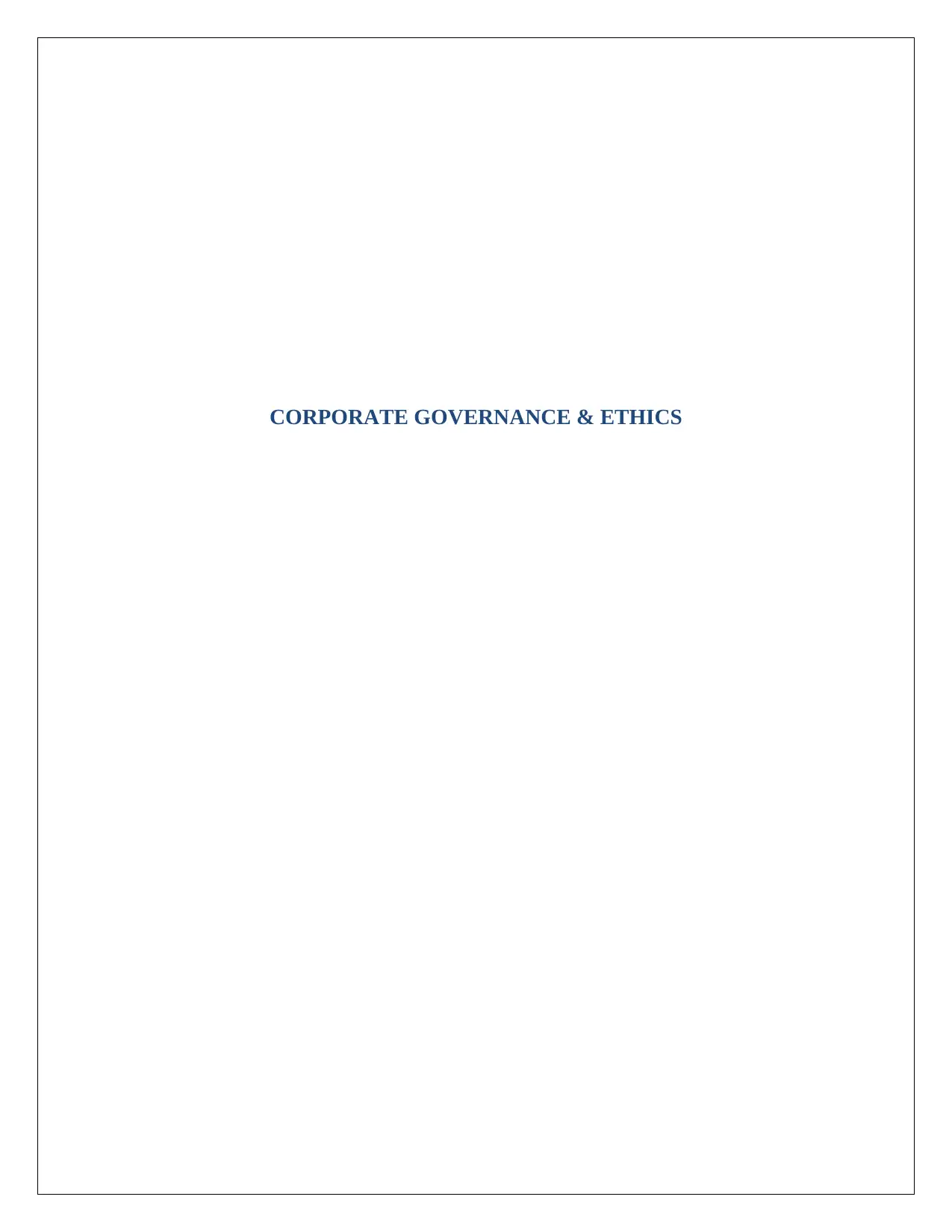
CORPORATE GOVERNANCE & ETHICS
Paraphrase This Document
Need a fresh take? Get an instant paraphrase of this document with our AI Paraphraser
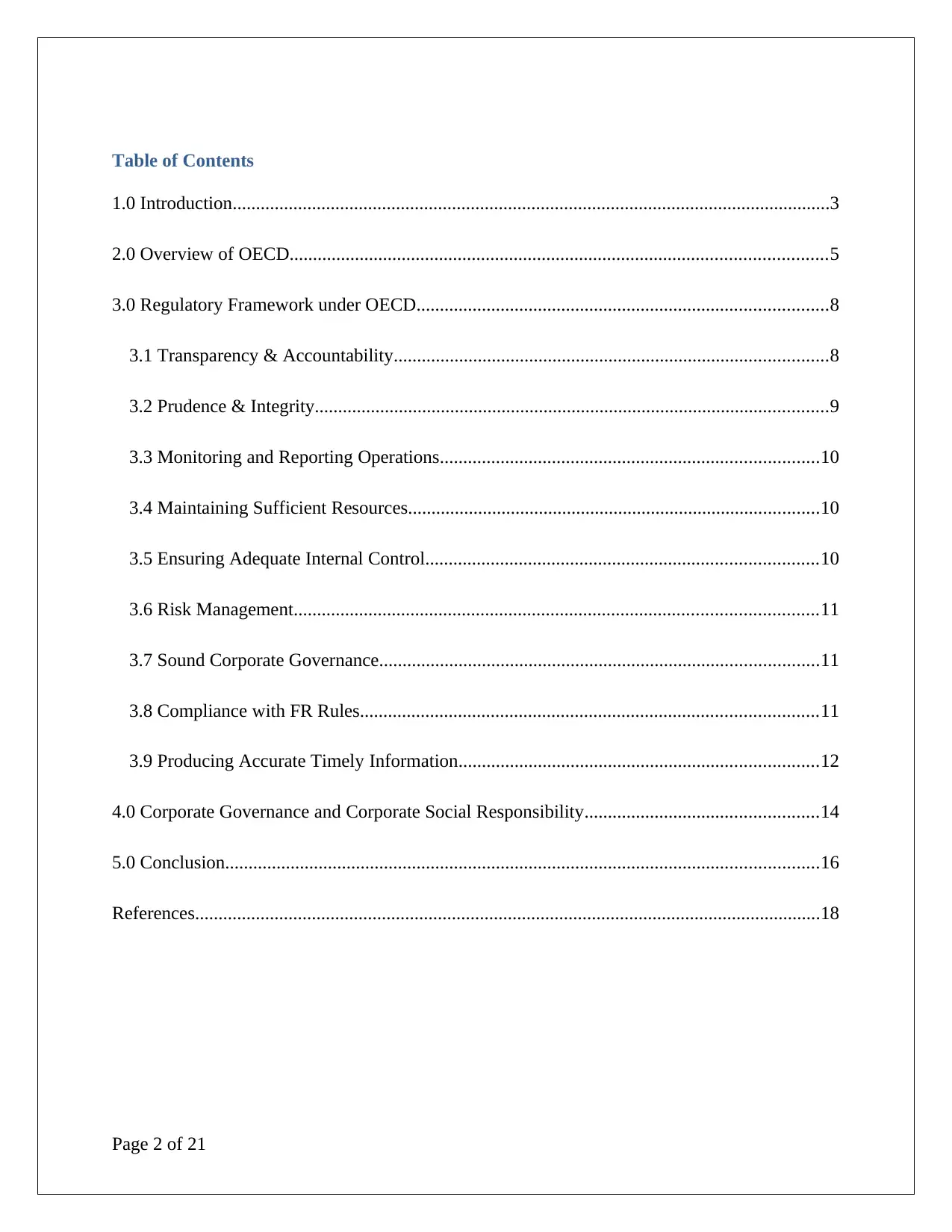
Table of Contents
1.0 Introduction................................................................................................................................3
2.0 Overview of OECD...................................................................................................................5
3.0 Regulatory Framework under OECD........................................................................................8
3.1 Transparency & Accountability.............................................................................................8
3.2 Prudence & Integrity..............................................................................................................9
3.3 Monitoring and Reporting Operations.................................................................................10
3.4 Maintaining Sufficient Resources........................................................................................10
3.5 Ensuring Adequate Internal Control....................................................................................10
3.6 Risk Management................................................................................................................11
3.7 Sound Corporate Governance..............................................................................................11
3.8 Compliance with FR Rules..................................................................................................11
3.9 Producing Accurate Timely Information.............................................................................12
4.0 Corporate Governance and Corporate Social Responsibility..................................................14
5.0 Conclusion...............................................................................................................................16
References......................................................................................................................................18
Page 2 of 21
1.0 Introduction................................................................................................................................3
2.0 Overview of OECD...................................................................................................................5
3.0 Regulatory Framework under OECD........................................................................................8
3.1 Transparency & Accountability.............................................................................................8
3.2 Prudence & Integrity..............................................................................................................9
3.3 Monitoring and Reporting Operations.................................................................................10
3.4 Maintaining Sufficient Resources........................................................................................10
3.5 Ensuring Adequate Internal Control....................................................................................10
3.6 Risk Management................................................................................................................11
3.7 Sound Corporate Governance..............................................................................................11
3.8 Compliance with FR Rules..................................................................................................11
3.9 Producing Accurate Timely Information.............................................................................12
4.0 Corporate Governance and Corporate Social Responsibility..................................................14
5.0 Conclusion...............................................................................................................................16
References......................................................................................................................................18
Page 2 of 21
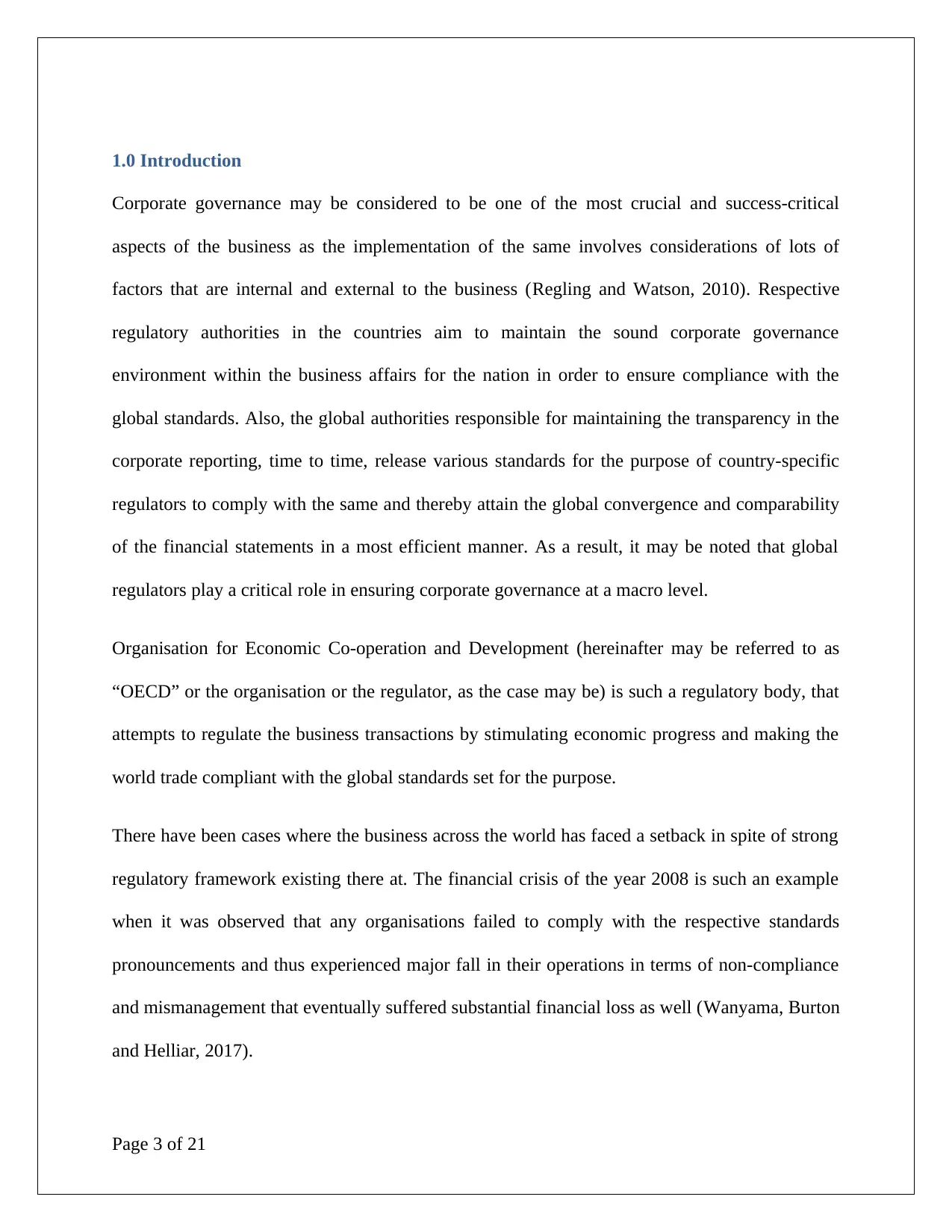
1.0 Introduction
Corporate governance may be considered to be one of the most crucial and success-critical
aspects of the business as the implementation of the same involves considerations of lots of
factors that are internal and external to the business (Regling and Watson, 2010). Respective
regulatory authorities in the countries aim to maintain the sound corporate governance
environment within the business affairs for the nation in order to ensure compliance with the
global standards. Also, the global authorities responsible for maintaining the transparency in the
corporate reporting, time to time, release various standards for the purpose of country-specific
regulators to comply with the same and thereby attain the global convergence and comparability
of the financial statements in a most efficient manner. As a result, it may be noted that global
regulators play a critical role in ensuring corporate governance at a macro level.
Organisation for Economic Co-operation and Development (hereinafter may be referred to as
“OECD” or the organisation or the regulator, as the case may be) is such a regulatory body, that
attempts to regulate the business transactions by stimulating economic progress and making the
world trade compliant with the global standards set for the purpose.
There have been cases where the business across the world has faced a setback in spite of strong
regulatory framework existing there at. The financial crisis of the year 2008 is such an example
when it was observed that any organisations failed to comply with the respective standards
pronouncements and thus experienced major fall in their operations in terms of non-compliance
and mismanagement that eventually suffered substantial financial loss as well (Wanyama, Burton
and Helliar, 2017).
Page 3 of 21
Corporate governance may be considered to be one of the most crucial and success-critical
aspects of the business as the implementation of the same involves considerations of lots of
factors that are internal and external to the business (Regling and Watson, 2010). Respective
regulatory authorities in the countries aim to maintain the sound corporate governance
environment within the business affairs for the nation in order to ensure compliance with the
global standards. Also, the global authorities responsible for maintaining the transparency in the
corporate reporting, time to time, release various standards for the purpose of country-specific
regulators to comply with the same and thereby attain the global convergence and comparability
of the financial statements in a most efficient manner. As a result, it may be noted that global
regulators play a critical role in ensuring corporate governance at a macro level.
Organisation for Economic Co-operation and Development (hereinafter may be referred to as
“OECD” or the organisation or the regulator, as the case may be) is such a regulatory body, that
attempts to regulate the business transactions by stimulating economic progress and making the
world trade compliant with the global standards set for the purpose.
There have been cases where the business across the world has faced a setback in spite of strong
regulatory framework existing there at. The financial crisis of the year 2008 is such an example
when it was observed that any organisations failed to comply with the respective standards
pronouncements and thus experienced major fall in their operations in terms of non-compliance
and mismanagement that eventually suffered substantial financial loss as well (Wanyama, Burton
and Helliar, 2017).
Page 3 of 21
⊘ This is a preview!⊘
Do you want full access?
Subscribe today to unlock all pages.

Trusted by 1+ million students worldwide
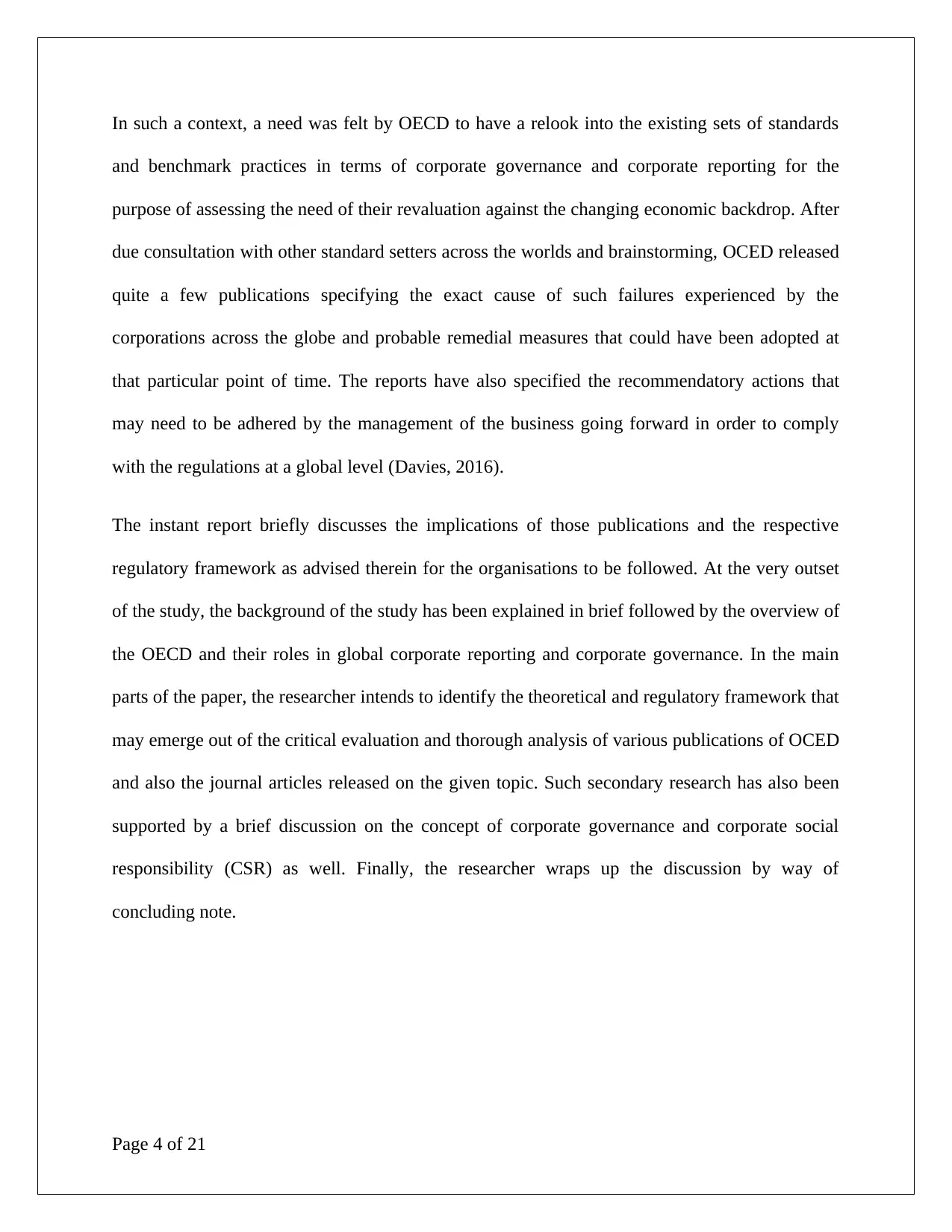
In such a context, a need was felt by OECD to have a relook into the existing sets of standards
and benchmark practices in terms of corporate governance and corporate reporting for the
purpose of assessing the need of their revaluation against the changing economic backdrop. After
due consultation with other standard setters across the worlds and brainstorming, OCED released
quite a few publications specifying the exact cause of such failures experienced by the
corporations across the globe and probable remedial measures that could have been adopted at
that particular point of time. The reports have also specified the recommendatory actions that
may need to be adhered by the management of the business going forward in order to comply
with the regulations at a global level (Davies, 2016).
The instant report briefly discusses the implications of those publications and the respective
regulatory framework as advised therein for the organisations to be followed. At the very outset
of the study, the background of the study has been explained in brief followed by the overview of
the OECD and their roles in global corporate reporting and corporate governance. In the main
parts of the paper, the researcher intends to identify the theoretical and regulatory framework that
may emerge out of the critical evaluation and thorough analysis of various publications of OCED
and also the journal articles released on the given topic. Such secondary research has also been
supported by a brief discussion on the concept of corporate governance and corporate social
responsibility (CSR) as well. Finally, the researcher wraps up the discussion by way of
concluding note.
Page 4 of 21
and benchmark practices in terms of corporate governance and corporate reporting for the
purpose of assessing the need of their revaluation against the changing economic backdrop. After
due consultation with other standard setters across the worlds and brainstorming, OCED released
quite a few publications specifying the exact cause of such failures experienced by the
corporations across the globe and probable remedial measures that could have been adopted at
that particular point of time. The reports have also specified the recommendatory actions that
may need to be adhered by the management of the business going forward in order to comply
with the regulations at a global level (Davies, 2016).
The instant report briefly discusses the implications of those publications and the respective
regulatory framework as advised therein for the organisations to be followed. At the very outset
of the study, the background of the study has been explained in brief followed by the overview of
the OECD and their roles in global corporate reporting and corporate governance. In the main
parts of the paper, the researcher intends to identify the theoretical and regulatory framework that
may emerge out of the critical evaluation and thorough analysis of various publications of OCED
and also the journal articles released on the given topic. Such secondary research has also been
supported by a brief discussion on the concept of corporate governance and corporate social
responsibility (CSR) as well. Finally, the researcher wraps up the discussion by way of
concluding note.
Page 4 of 21
Paraphrase This Document
Need a fresh take? Get an instant paraphrase of this document with our AI Paraphraser
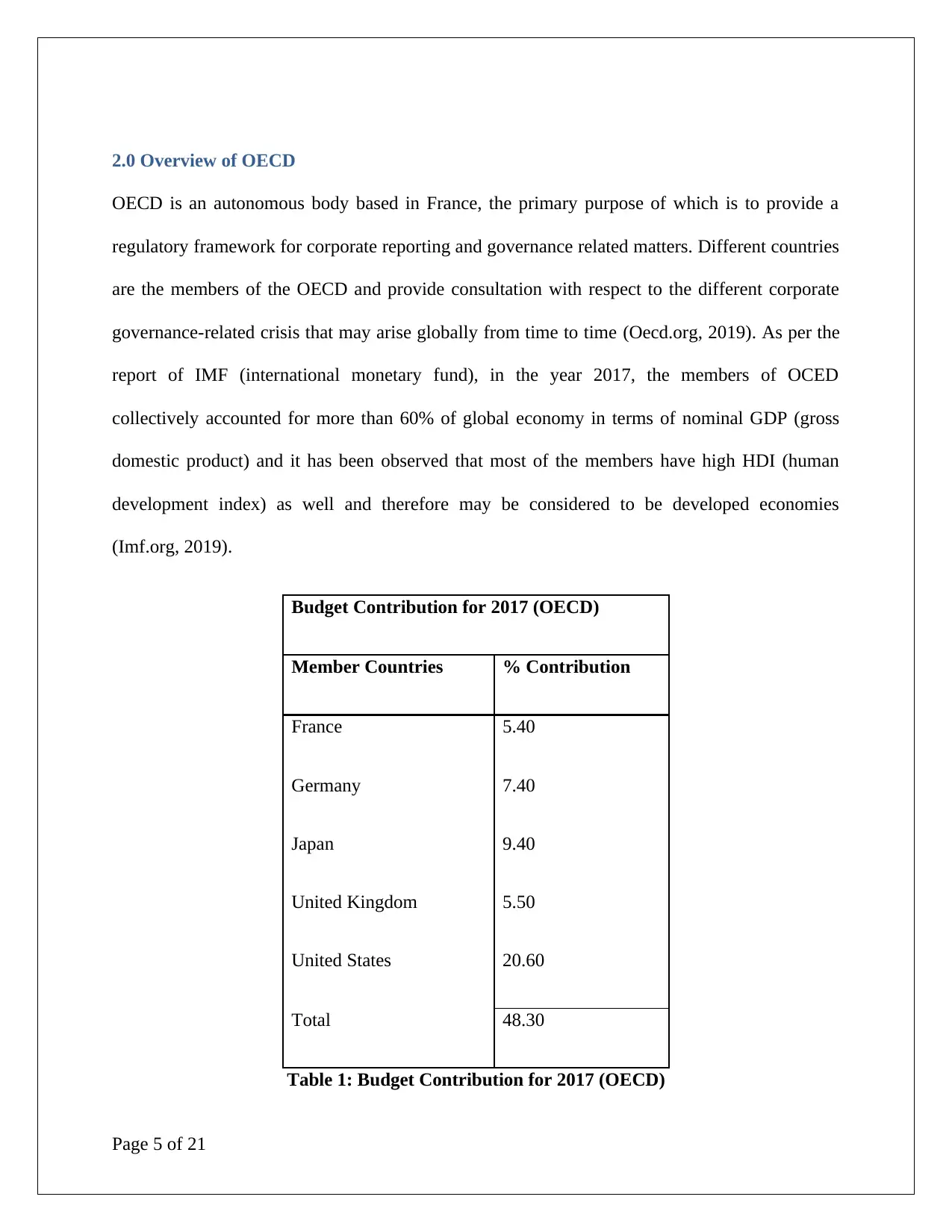
2.0 Overview of OECD
OECD is an autonomous body based in France, the primary purpose of which is to provide a
regulatory framework for corporate reporting and governance related matters. Different countries
are the members of the OECD and provide consultation with respect to the different corporate
governance-related crisis that may arise globally from time to time (Oecd.org, 2019). As per the
report of IMF (international monetary fund), in the year 2017, the members of OCED
collectively accounted for more than 60% of global economy in terms of nominal GDP (gross
domestic product) and it has been observed that most of the members have high HDI (human
development index) as well and therefore may be considered to be developed economies
(Imf.org, 2019).
Budget Contribution for 2017 (OECD)
Member Countries % Contribution
France 5.40
Germany 7.40
Japan 9.40
United Kingdom 5.50
United States 20.60
Total 48.30
Table 1: Budget Contribution for 2017 (OECD)
Page 5 of 21
OECD is an autonomous body based in France, the primary purpose of which is to provide a
regulatory framework for corporate reporting and governance related matters. Different countries
are the members of the OECD and provide consultation with respect to the different corporate
governance-related crisis that may arise globally from time to time (Oecd.org, 2019). As per the
report of IMF (international monetary fund), in the year 2017, the members of OCED
collectively accounted for more than 60% of global economy in terms of nominal GDP (gross
domestic product) and it has been observed that most of the members have high HDI (human
development index) as well and therefore may be considered to be developed economies
(Imf.org, 2019).
Budget Contribution for 2017 (OECD)
Member Countries % Contribution
France 5.40
Germany 7.40
Japan 9.40
United Kingdom 5.50
United States 20.60
Total 48.30
Table 1: Budget Contribution for 2017 (OECD)
Page 5 of 21
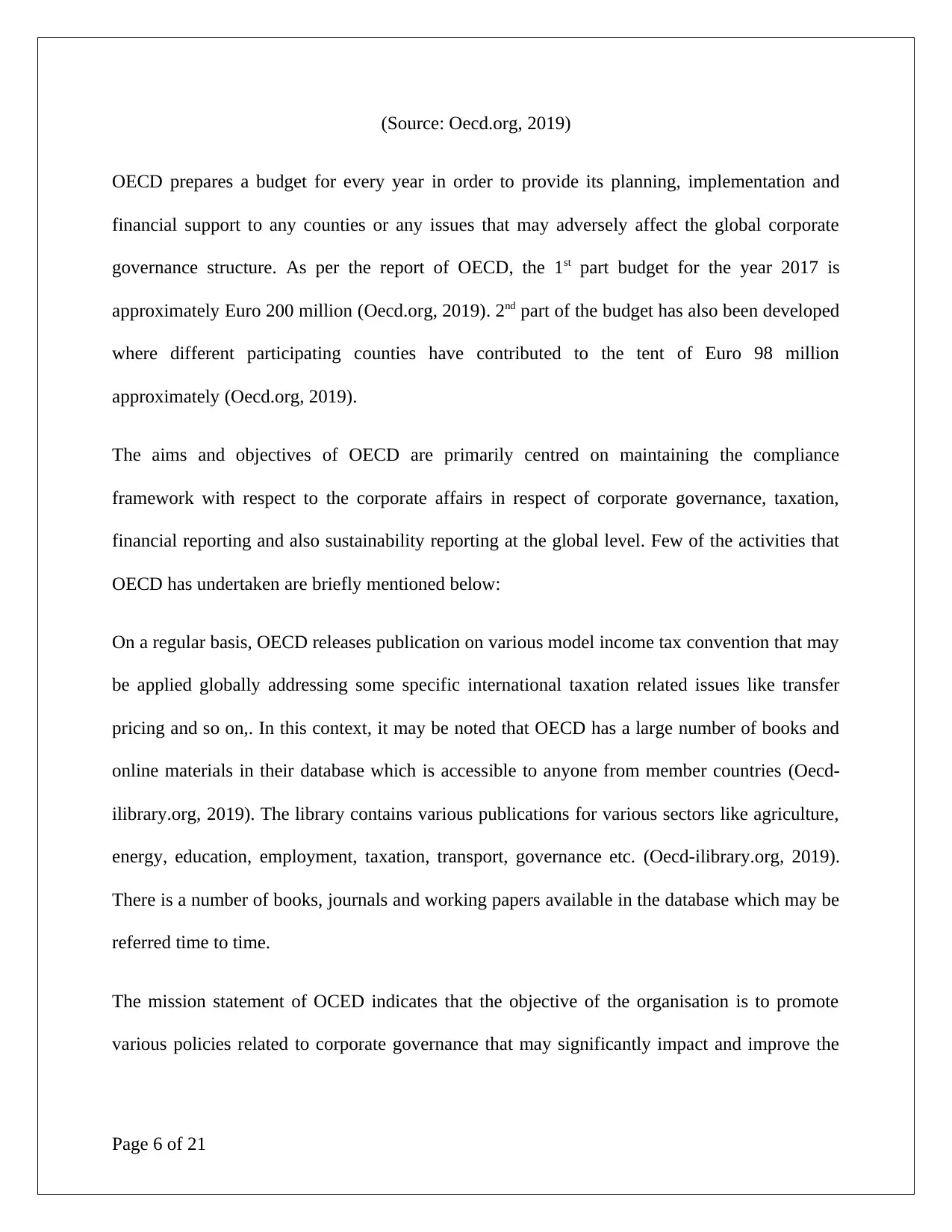
(Source: Oecd.org, 2019)
OECD prepares a budget for every year in order to provide its planning, implementation and
financial support to any counties or any issues that may adversely affect the global corporate
governance structure. As per the report of OECD, the 1st part budget for the year 2017 is
approximately Euro 200 million (Oecd.org, 2019). 2nd part of the budget has also been developed
where different participating counties have contributed to the tent of Euro 98 million
approximately (Oecd.org, 2019).
The aims and objectives of OECD are primarily centred on maintaining the compliance
framework with respect to the corporate affairs in respect of corporate governance, taxation,
financial reporting and also sustainability reporting at the global level. Few of the activities that
OECD has undertaken are briefly mentioned below:
On a regular basis, OECD releases publication on various model income tax convention that may
be applied globally addressing some specific international taxation related issues like transfer
pricing and so on,. In this context, it may be noted that OECD has a large number of books and
online materials in their database which is accessible to anyone from member countries (Oecd-
ilibrary.org, 2019). The library contains various publications for various sectors like agriculture,
energy, education, employment, taxation, transport, governance etc. (Oecd-ilibrary.org, 2019).
There is a number of books, journals and working papers available in the database which may be
referred time to time.
The mission statement of OCED indicates that the objective of the organisation is to promote
various policies related to corporate governance that may significantly impact and improve the
Page 6 of 21
OECD prepares a budget for every year in order to provide its planning, implementation and
financial support to any counties or any issues that may adversely affect the global corporate
governance structure. As per the report of OECD, the 1st part budget for the year 2017 is
approximately Euro 200 million (Oecd.org, 2019). 2nd part of the budget has also been developed
where different participating counties have contributed to the tent of Euro 98 million
approximately (Oecd.org, 2019).
The aims and objectives of OECD are primarily centred on maintaining the compliance
framework with respect to the corporate affairs in respect of corporate governance, taxation,
financial reporting and also sustainability reporting at the global level. Few of the activities that
OECD has undertaken are briefly mentioned below:
On a regular basis, OECD releases publication on various model income tax convention that may
be applied globally addressing some specific international taxation related issues like transfer
pricing and so on,. In this context, it may be noted that OECD has a large number of books and
online materials in their database which is accessible to anyone from member countries (Oecd-
ilibrary.org, 2019). The library contains various publications for various sectors like agriculture,
energy, education, employment, taxation, transport, governance etc. (Oecd-ilibrary.org, 2019).
There is a number of books, journals and working papers available in the database which may be
referred time to time.
The mission statement of OCED indicates that the objective of the organisation is to promote
various policies related to corporate governance that may significantly impact and improve the
Page 6 of 21
⊘ This is a preview!⊘
Do you want full access?
Subscribe today to unlock all pages.

Trusted by 1+ million students worldwide
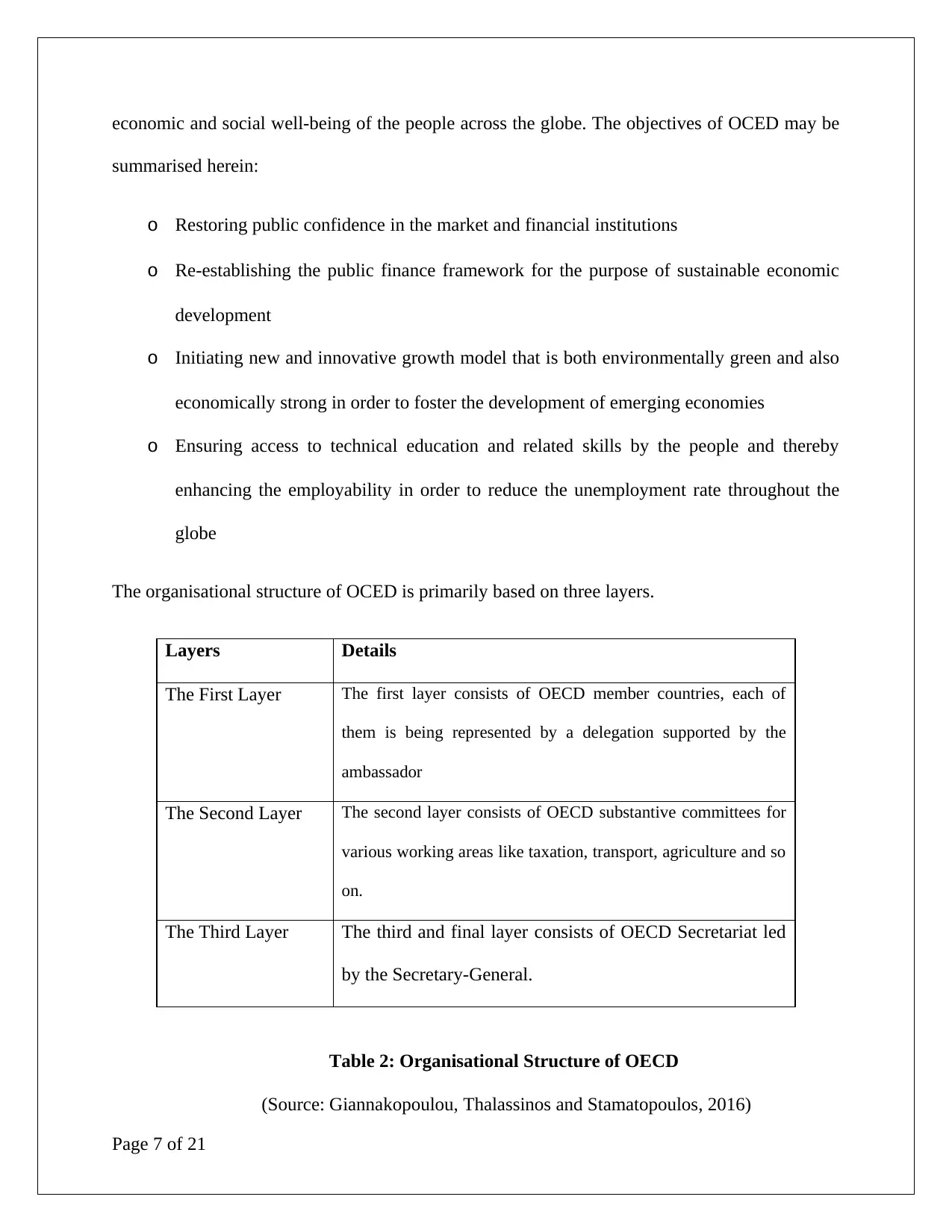
economic and social well-being of the people across the globe. The objectives of OCED may be
summarised herein:
o Restoring public confidence in the market and financial institutions
o Re-establishing the public finance framework for the purpose of sustainable economic
development
o Initiating new and innovative growth model that is both environmentally green and also
economically strong in order to foster the development of emerging economies
o Ensuring access to technical education and related skills by the people and thereby
enhancing the employability in order to reduce the unemployment rate throughout the
globe
The organisational structure of OCED is primarily based on three layers.
Layers Details
The First Layer The first layer consists of OECD member countries, each of
them is being represented by a delegation supported by the
ambassador
The Second Layer The second layer consists of OECD substantive committees for
various working areas like taxation, transport, agriculture and so
on.
The Third Layer The third and final layer consists of OECD Secretariat led
by the Secretary-General.
Table 2: Organisational Structure of OECD
(Source: Giannakopoulou, Thalassinos and Stamatopoulos, 2016)
Page 7 of 21
summarised herein:
o Restoring public confidence in the market and financial institutions
o Re-establishing the public finance framework for the purpose of sustainable economic
development
o Initiating new and innovative growth model that is both environmentally green and also
economically strong in order to foster the development of emerging economies
o Ensuring access to technical education and related skills by the people and thereby
enhancing the employability in order to reduce the unemployment rate throughout the
globe
The organisational structure of OCED is primarily based on three layers.
Layers Details
The First Layer The first layer consists of OECD member countries, each of
them is being represented by a delegation supported by the
ambassador
The Second Layer The second layer consists of OECD substantive committees for
various working areas like taxation, transport, agriculture and so
on.
The Third Layer The third and final layer consists of OECD Secretariat led
by the Secretary-General.
Table 2: Organisational Structure of OECD
(Source: Giannakopoulou, Thalassinos and Stamatopoulos, 2016)
Page 7 of 21
Paraphrase This Document
Need a fresh take? Get an instant paraphrase of this document with our AI Paraphraser
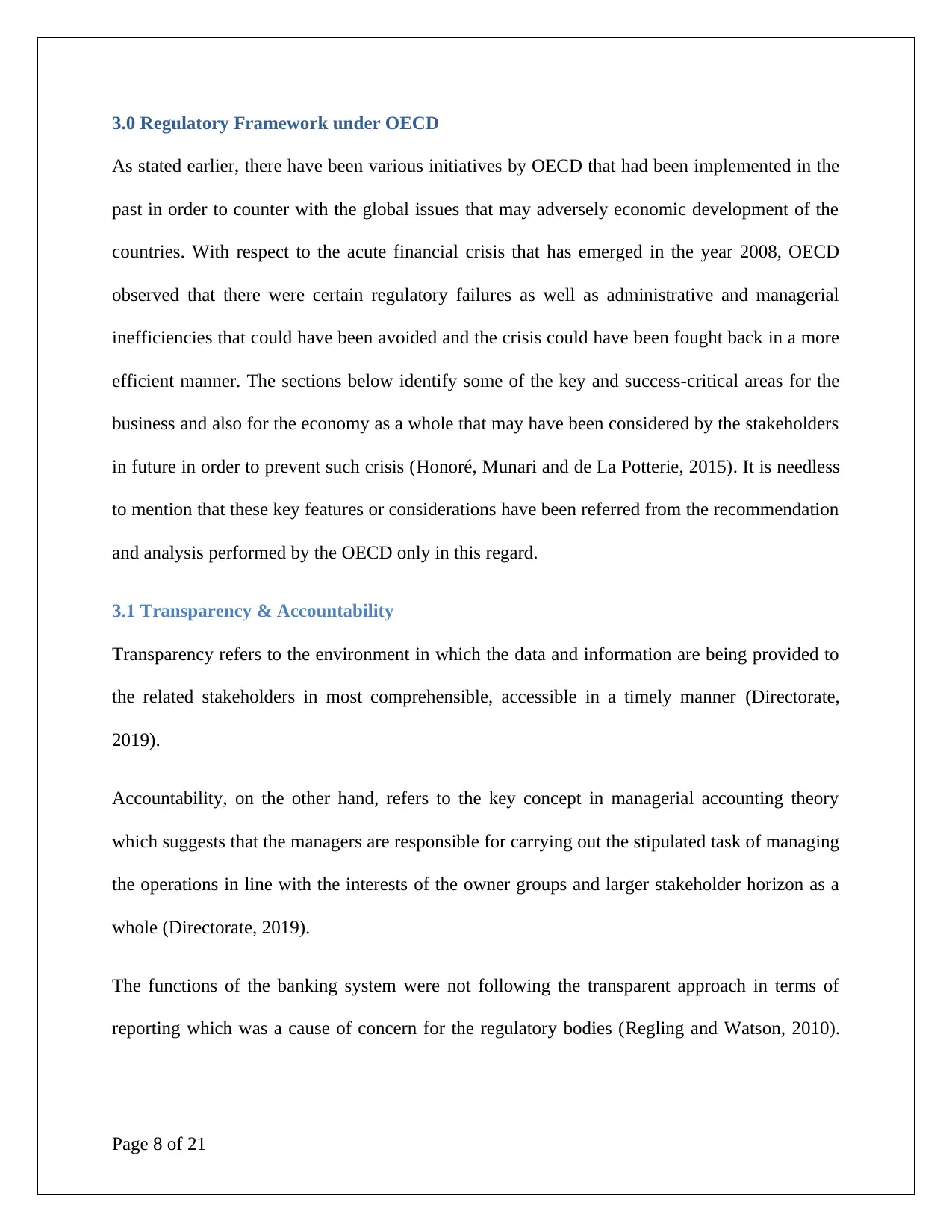
3.0 Regulatory Framework under OECD
As stated earlier, there have been various initiatives by OECD that had been implemented in the
past in order to counter with the global issues that may adversely economic development of the
countries. With respect to the acute financial crisis that has emerged in the year 2008, OECD
observed that there were certain regulatory failures as well as administrative and managerial
inefficiencies that could have been avoided and the crisis could have been fought back in a more
efficient manner. The sections below identify some of the key and success-critical areas for the
business and also for the economy as a whole that may have been considered by the stakeholders
in future in order to prevent such crisis (Honoré, Munari and de La Potterie, 2015). It is needless
to mention that these key features or considerations have been referred from the recommendation
and analysis performed by the OECD only in this regard.
3.1 Transparency & Accountability
Transparency refers to the environment in which the data and information are being provided to
the related stakeholders in most comprehensible, accessible in a timely manner (Directorate,
2019).
Accountability, on the other hand, refers to the key concept in managerial accounting theory
which suggests that the managers are responsible for carrying out the stipulated task of managing
the operations in line with the interests of the owner groups and larger stakeholder horizon as a
whole (Directorate, 2019).
The functions of the banking system were not following the transparent approach in terms of
reporting which was a cause of concern for the regulatory bodies (Regling and Watson, 2010).
Page 8 of 21
As stated earlier, there have been various initiatives by OECD that had been implemented in the
past in order to counter with the global issues that may adversely economic development of the
countries. With respect to the acute financial crisis that has emerged in the year 2008, OECD
observed that there were certain regulatory failures as well as administrative and managerial
inefficiencies that could have been avoided and the crisis could have been fought back in a more
efficient manner. The sections below identify some of the key and success-critical areas for the
business and also for the economy as a whole that may have been considered by the stakeholders
in future in order to prevent such crisis (Honoré, Munari and de La Potterie, 2015). It is needless
to mention that these key features or considerations have been referred from the recommendation
and analysis performed by the OECD only in this regard.
3.1 Transparency & Accountability
Transparency refers to the environment in which the data and information are being provided to
the related stakeholders in most comprehensible, accessible in a timely manner (Directorate,
2019).
Accountability, on the other hand, refers to the key concept in managerial accounting theory
which suggests that the managers are responsible for carrying out the stipulated task of managing
the operations in line with the interests of the owner groups and larger stakeholder horizon as a
whole (Directorate, 2019).
The functions of the banking system were not following the transparent approach in terms of
reporting which was a cause of concern for the regulatory bodies (Regling and Watson, 2010).
Page 8 of 21
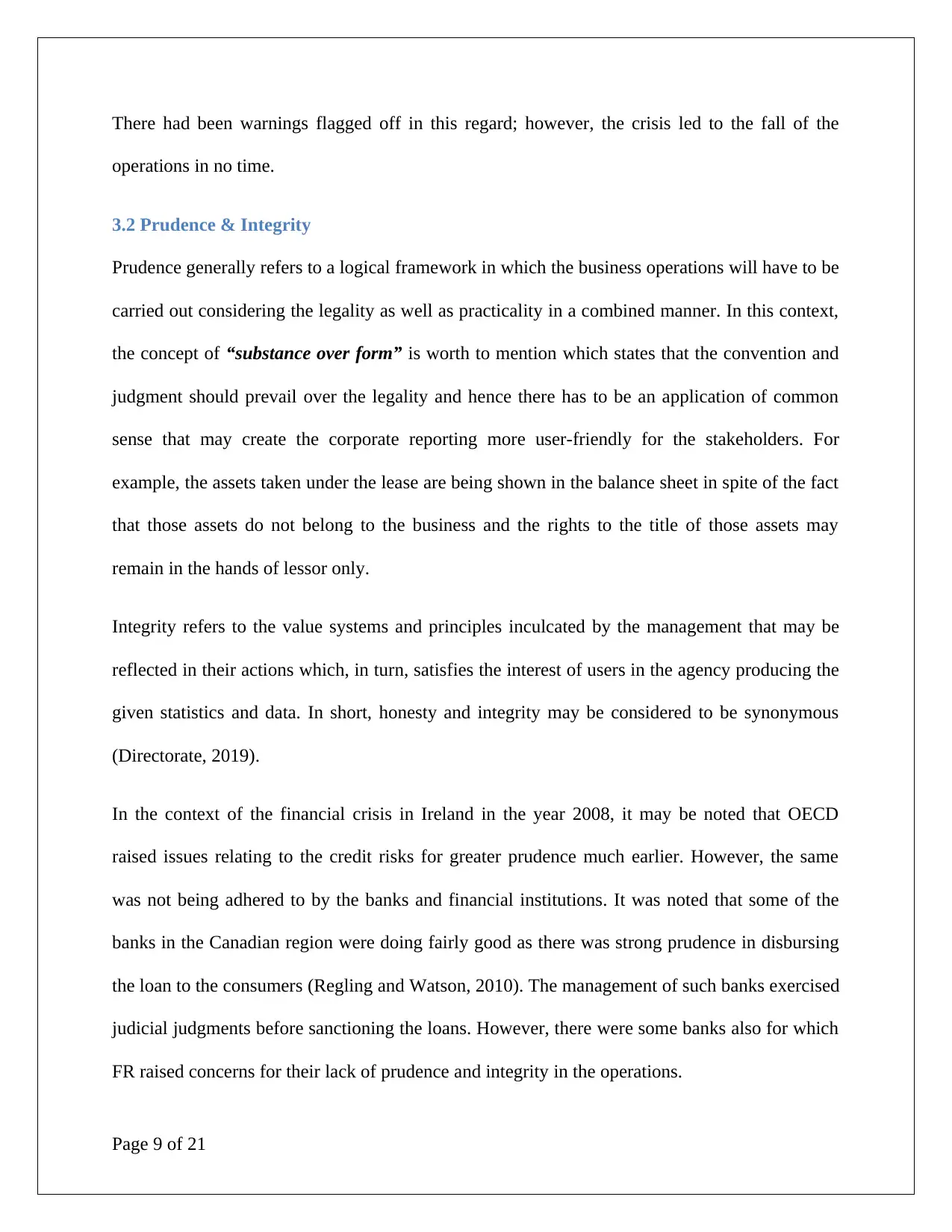
There had been warnings flagged off in this regard; however, the crisis led to the fall of the
operations in no time.
3.2 Prudence & Integrity
Prudence generally refers to a logical framework in which the business operations will have to be
carried out considering the legality as well as practicality in a combined manner. In this context,
the concept of “substance over form” is worth to mention which states that the convention and
judgment should prevail over the legality and hence there has to be an application of common
sense that may create the corporate reporting more user-friendly for the stakeholders. For
example, the assets taken under the lease are being shown in the balance sheet in spite of the fact
that those assets do not belong to the business and the rights to the title of those assets may
remain in the hands of lessor only.
Integrity refers to the value systems and principles inculcated by the management that may be
reflected in their actions which, in turn, satisfies the interest of users in the agency producing the
given statistics and data. In short, honesty and integrity may be considered to be synonymous
(Directorate, 2019).
In the context of the financial crisis in Ireland in the year 2008, it may be noted that OECD
raised issues relating to the credit risks for greater prudence much earlier. However, the same
was not being adhered to by the banks and financial institutions. It was noted that some of the
banks in the Canadian region were doing fairly good as there was strong prudence in disbursing
the loan to the consumers (Regling and Watson, 2010). The management of such banks exercised
judicial judgments before sanctioning the loans. However, there were some banks also for which
FR raised concerns for their lack of prudence and integrity in the operations.
Page 9 of 21
operations in no time.
3.2 Prudence & Integrity
Prudence generally refers to a logical framework in which the business operations will have to be
carried out considering the legality as well as practicality in a combined manner. In this context,
the concept of “substance over form” is worth to mention which states that the convention and
judgment should prevail over the legality and hence there has to be an application of common
sense that may create the corporate reporting more user-friendly for the stakeholders. For
example, the assets taken under the lease are being shown in the balance sheet in spite of the fact
that those assets do not belong to the business and the rights to the title of those assets may
remain in the hands of lessor only.
Integrity refers to the value systems and principles inculcated by the management that may be
reflected in their actions which, in turn, satisfies the interest of users in the agency producing the
given statistics and data. In short, honesty and integrity may be considered to be synonymous
(Directorate, 2019).
In the context of the financial crisis in Ireland in the year 2008, it may be noted that OECD
raised issues relating to the credit risks for greater prudence much earlier. However, the same
was not being adhered to by the banks and financial institutions. It was noted that some of the
banks in the Canadian region were doing fairly good as there was strong prudence in disbursing
the loan to the consumers (Regling and Watson, 2010). The management of such banks exercised
judicial judgments before sanctioning the loans. However, there were some banks also for which
FR raised concerns for their lack of prudence and integrity in the operations.
Page 9 of 21
⊘ This is a preview!⊘
Do you want full access?
Subscribe today to unlock all pages.

Trusted by 1+ million students worldwide
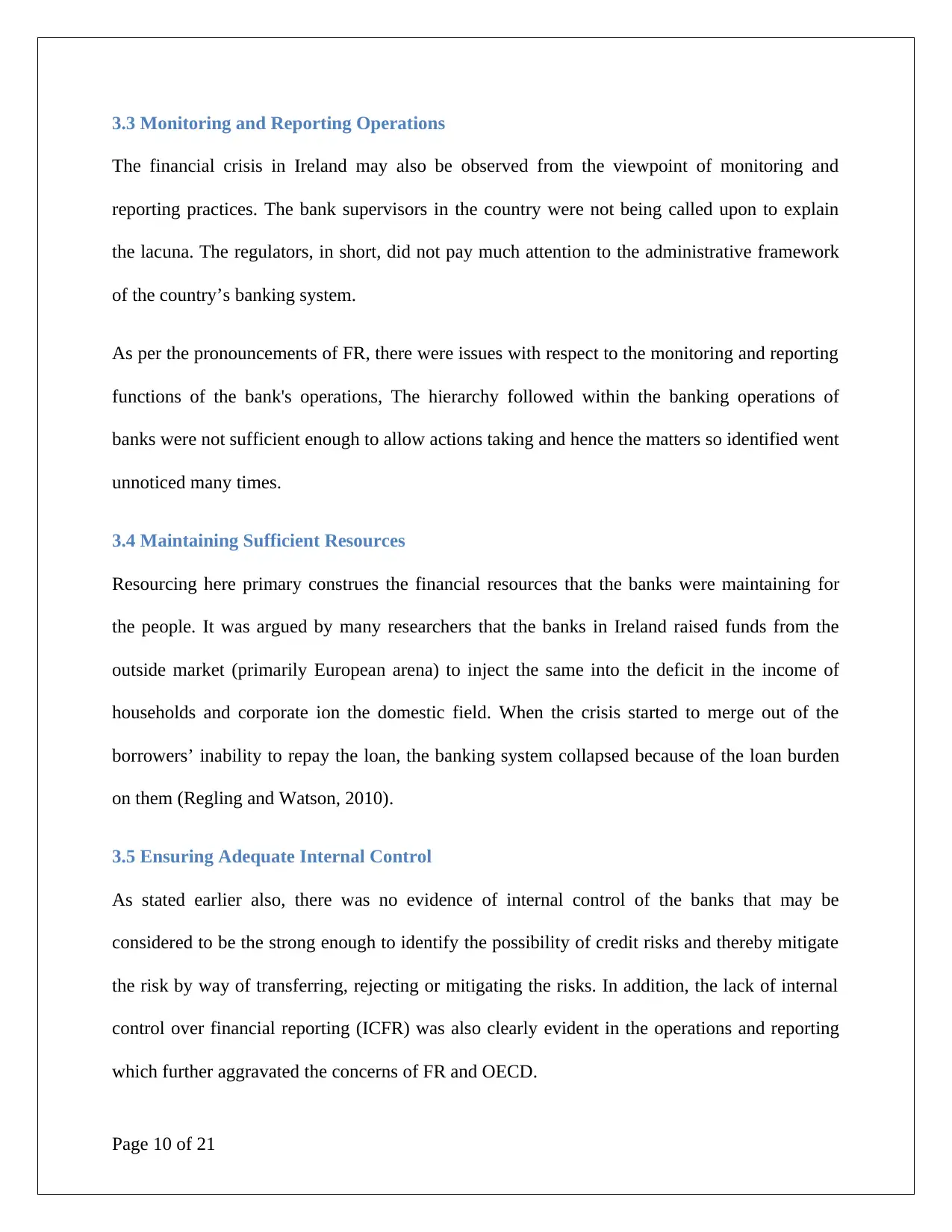
3.3 Monitoring and Reporting Operations
The financial crisis in Ireland may also be observed from the viewpoint of monitoring and
reporting practices. The bank supervisors in the country were not being called upon to explain
the lacuna. The regulators, in short, did not pay much attention to the administrative framework
of the country’s banking system.
As per the pronouncements of FR, there were issues with respect to the monitoring and reporting
functions of the bank's operations, The hierarchy followed within the banking operations of
banks were not sufficient enough to allow actions taking and hence the matters so identified went
unnoticed many times.
3.4 Maintaining Sufficient Resources
Resourcing here primary construes the financial resources that the banks were maintaining for
the people. It was argued by many researchers that the banks in Ireland raised funds from the
outside market (primarily European arena) to inject the same into the deficit in the income of
households and corporate ion the domestic field. When the crisis started to merge out of the
borrowers’ inability to repay the loan, the banking system collapsed because of the loan burden
on them (Regling and Watson, 2010).
3.5 Ensuring Adequate Internal Control
As stated earlier also, there was no evidence of internal control of the banks that may be
considered to be the strong enough to identify the possibility of credit risks and thereby mitigate
the risk by way of transferring, rejecting or mitigating the risks. In addition, the lack of internal
control over financial reporting (ICFR) was also clearly evident in the operations and reporting
which further aggravated the concerns of FR and OECD.
Page 10 of 21
The financial crisis in Ireland may also be observed from the viewpoint of monitoring and
reporting practices. The bank supervisors in the country were not being called upon to explain
the lacuna. The regulators, in short, did not pay much attention to the administrative framework
of the country’s banking system.
As per the pronouncements of FR, there were issues with respect to the monitoring and reporting
functions of the bank's operations, The hierarchy followed within the banking operations of
banks were not sufficient enough to allow actions taking and hence the matters so identified went
unnoticed many times.
3.4 Maintaining Sufficient Resources
Resourcing here primary construes the financial resources that the banks were maintaining for
the people. It was argued by many researchers that the banks in Ireland raised funds from the
outside market (primarily European arena) to inject the same into the deficit in the income of
households and corporate ion the domestic field. When the crisis started to merge out of the
borrowers’ inability to repay the loan, the banking system collapsed because of the loan burden
on them (Regling and Watson, 2010).
3.5 Ensuring Adequate Internal Control
As stated earlier also, there was no evidence of internal control of the banks that may be
considered to be the strong enough to identify the possibility of credit risks and thereby mitigate
the risk by way of transferring, rejecting or mitigating the risks. In addition, the lack of internal
control over financial reporting (ICFR) was also clearly evident in the operations and reporting
which further aggravated the concerns of FR and OECD.
Page 10 of 21
Paraphrase This Document
Need a fresh take? Get an instant paraphrase of this document with our AI Paraphraser
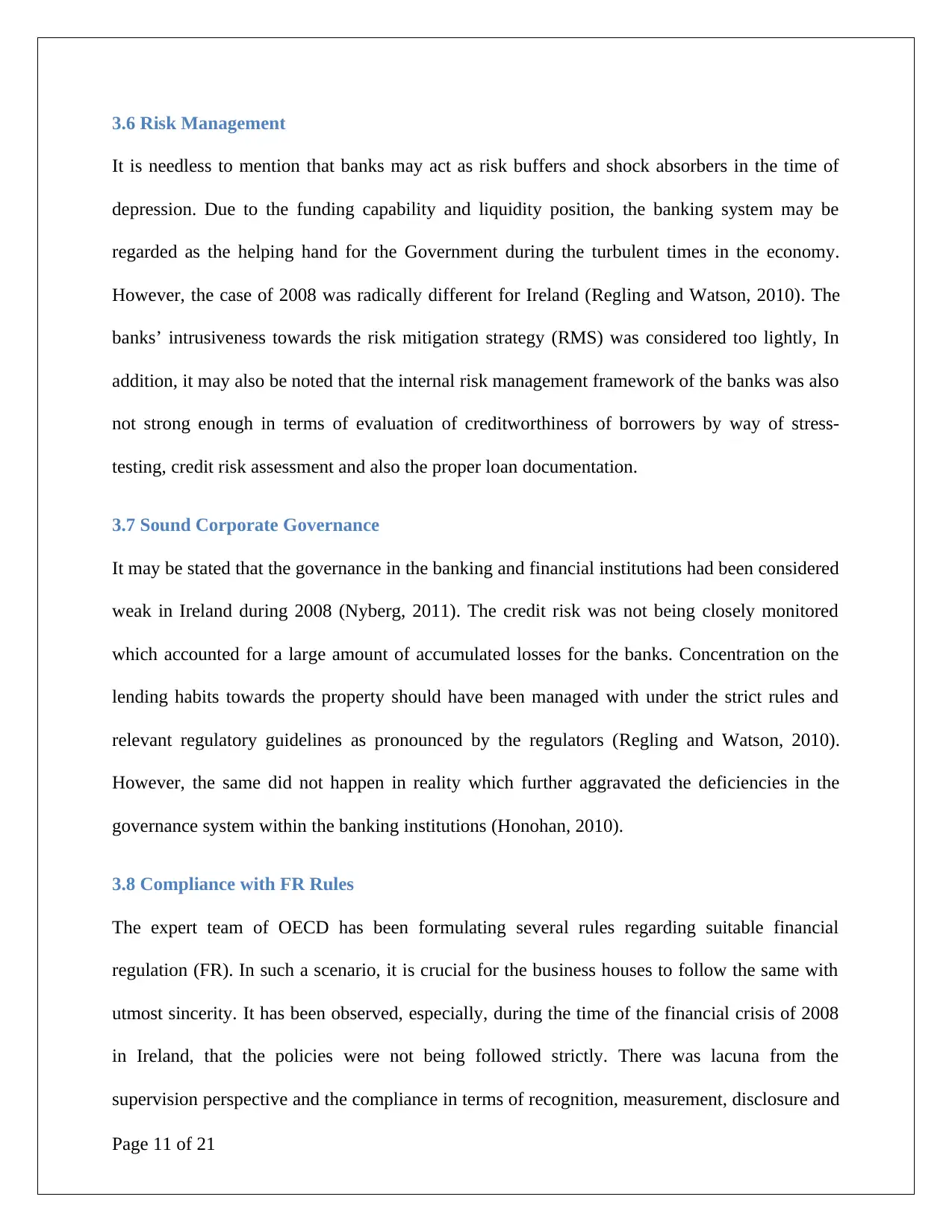
3.6 Risk Management
It is needless to mention that banks may act as risk buffers and shock absorbers in the time of
depression. Due to the funding capability and liquidity position, the banking system may be
regarded as the helping hand for the Government during the turbulent times in the economy.
However, the case of 2008 was radically different for Ireland (Regling and Watson, 2010). The
banks’ intrusiveness towards the risk mitigation strategy (RMS) was considered too lightly, In
addition, it may also be noted that the internal risk management framework of the banks was also
not strong enough in terms of evaluation of creditworthiness of borrowers by way of stress-
testing, credit risk assessment and also the proper loan documentation.
3.7 Sound Corporate Governance
It may be stated that the governance in the banking and financial institutions had been considered
weak in Ireland during 2008 (Nyberg, 2011). The credit risk was not being closely monitored
which accounted for a large amount of accumulated losses for the banks. Concentration on the
lending habits towards the property should have been managed with under the strict rules and
relevant regulatory guidelines as pronounced by the regulators (Regling and Watson, 2010).
However, the same did not happen in reality which further aggravated the deficiencies in the
governance system within the banking institutions (Honohan, 2010).
3.8 Compliance with FR Rules
The expert team of OECD has been formulating several rules regarding suitable financial
regulation (FR). In such a scenario, it is crucial for the business houses to follow the same with
utmost sincerity. It has been observed, especially, during the time of the financial crisis of 2008
in Ireland, that the policies were not being followed strictly. There was lacuna from the
supervision perspective and the compliance in terms of recognition, measurement, disclosure and
Page 11 of 21
It is needless to mention that banks may act as risk buffers and shock absorbers in the time of
depression. Due to the funding capability and liquidity position, the banking system may be
regarded as the helping hand for the Government during the turbulent times in the economy.
However, the case of 2008 was radically different for Ireland (Regling and Watson, 2010). The
banks’ intrusiveness towards the risk mitigation strategy (RMS) was considered too lightly, In
addition, it may also be noted that the internal risk management framework of the banks was also
not strong enough in terms of evaluation of creditworthiness of borrowers by way of stress-
testing, credit risk assessment and also the proper loan documentation.
3.7 Sound Corporate Governance
It may be stated that the governance in the banking and financial institutions had been considered
weak in Ireland during 2008 (Nyberg, 2011). The credit risk was not being closely monitored
which accounted for a large amount of accumulated losses for the banks. Concentration on the
lending habits towards the property should have been managed with under the strict rules and
relevant regulatory guidelines as pronounced by the regulators (Regling and Watson, 2010).
However, the same did not happen in reality which further aggravated the deficiencies in the
governance system within the banking institutions (Honohan, 2010).
3.8 Compliance with FR Rules
The expert team of OECD has been formulating several rules regarding suitable financial
regulation (FR). In such a scenario, it is crucial for the business houses to follow the same with
utmost sincerity. It has been observed, especially, during the time of the financial crisis of 2008
in Ireland, that the policies were not being followed strictly. There was lacuna from the
supervision perspective and the compliance in terms of recognition, measurement, disclosure and
Page 11 of 21
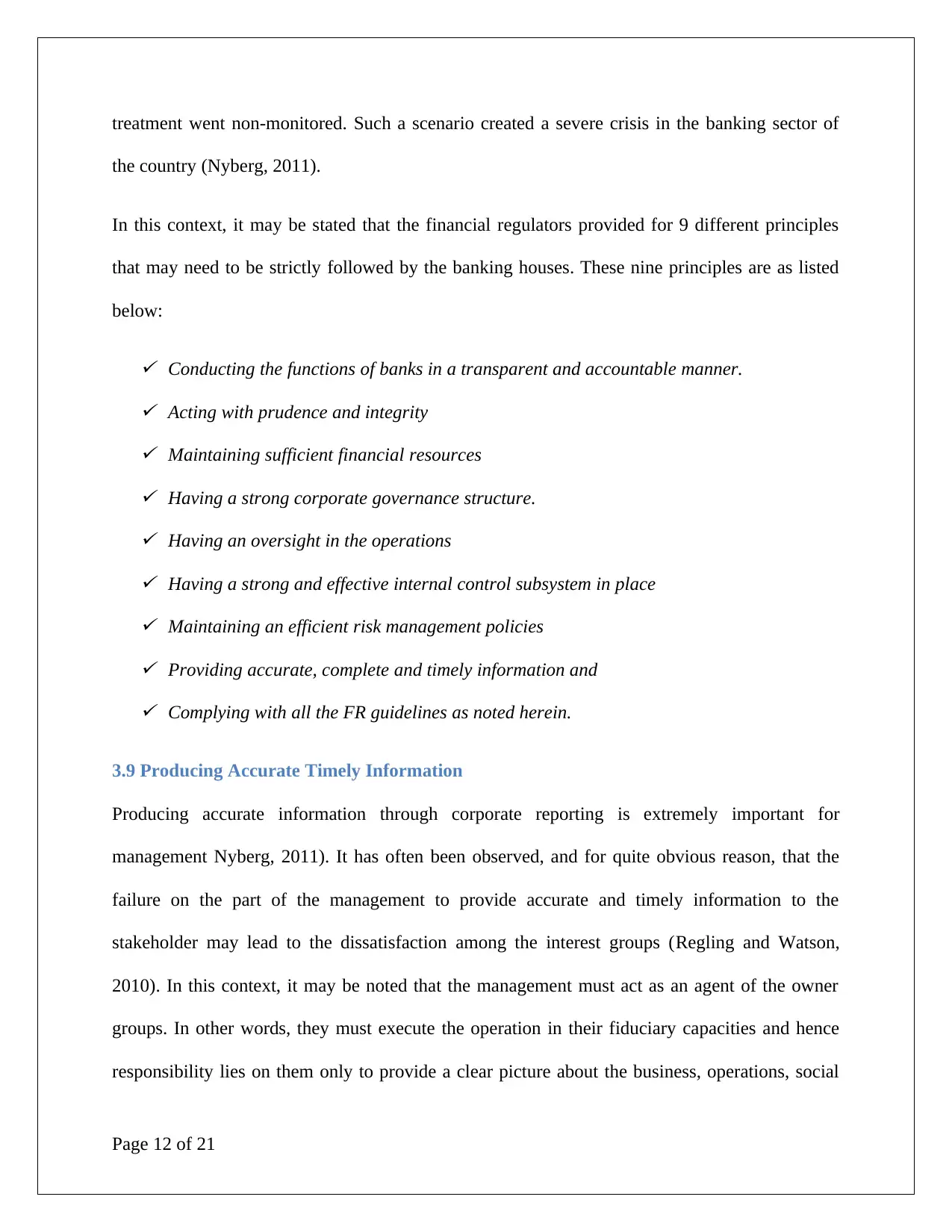
treatment went non-monitored. Such a scenario created a severe crisis in the banking sector of
the country (Nyberg, 2011).
In this context, it may be stated that the financial regulators provided for 9 different principles
that may need to be strictly followed by the banking houses. These nine principles are as listed
below:
Conducting the functions of banks in a transparent and accountable manner. Acting with prudence and integrity Maintaining sufficient financial resources Having a strong corporate governance structure. Having an oversight in the operations Having a strong and effective internal control subsystem in place Maintaining an efficient risk management policies Providing accurate, complete and timely information and Complying with all the FR guidelines as noted herein.
3.9 Producing Accurate Timely Information
Producing accurate information through corporate reporting is extremely important for
management Nyberg, 2011). It has often been observed, and for quite obvious reason, that the
failure on the part of the management to provide accurate and timely information to the
stakeholder may lead to the dissatisfaction among the interest groups (Regling and Watson,
2010). In this context, it may be noted that the management must act as an agent of the owner
groups. In other words, they must execute the operation in their fiduciary capacities and hence
responsibility lies on them only to provide a clear picture about the business, operations, social
Page 12 of 21
the country (Nyberg, 2011).
In this context, it may be stated that the financial regulators provided for 9 different principles
that may need to be strictly followed by the banking houses. These nine principles are as listed
below:
Conducting the functions of banks in a transparent and accountable manner. Acting with prudence and integrity Maintaining sufficient financial resources Having a strong corporate governance structure. Having an oversight in the operations Having a strong and effective internal control subsystem in place Maintaining an efficient risk management policies Providing accurate, complete and timely information and Complying with all the FR guidelines as noted herein.
3.9 Producing Accurate Timely Information
Producing accurate information through corporate reporting is extremely important for
management Nyberg, 2011). It has often been observed, and for quite obvious reason, that the
failure on the part of the management to provide accurate and timely information to the
stakeholder may lead to the dissatisfaction among the interest groups (Regling and Watson,
2010). In this context, it may be noted that the management must act as an agent of the owner
groups. In other words, they must execute the operation in their fiduciary capacities and hence
responsibility lies on them only to provide a clear picture about the business, operations, social
Page 12 of 21
⊘ This is a preview!⊘
Do you want full access?
Subscribe today to unlock all pages.

Trusted by 1+ million students worldwide
1 out of 21
Related Documents
Your All-in-One AI-Powered Toolkit for Academic Success.
+13062052269
info@desklib.com
Available 24*7 on WhatsApp / Email
![[object Object]](/_next/static/media/star-bottom.7253800d.svg)
Unlock your academic potential
Copyright © 2020–2026 A2Z Services. All Rights Reserved. Developed and managed by ZUCOL.




